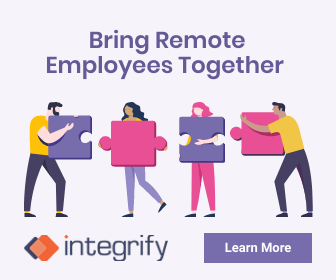Starting My First Job Entirely Remote: Advantages & Disadvantages
By Katy Reid ![]() | Published March 25, 2021
| Published March 25, 2021
When I used to think about what my future first job would be and would be like, I was pretty far off relating to where I would be, what I would be doing, and the experiences I would be having. Once I was in college, I began to picture myself working in a large corporate office in Chicago. Which isn't very far off from what I did end up to be doing, but one thing I definitely didn't expect was starting my first job during a global pandemic.
With constant news of friends and relatives who were laid off or furloughed, I was filled with gratitude to know I had landed my first job—especially with all that was, and still is, going on in the world. I was scared I would have to move back home for a long time rather than getting out and starting my life. For obvious reasons, I did end up moving back home, but I was no longer upset about it because I knew I had a duty to protect myself and others from the spread of this deadly virus. Despite knowing this transition period from college to the real world would look different from what I expected, I am very fortunate for the opportunities that came my way in 2020. In this article, I will be unpacking what it has been like to start a job entirely virtually, as well as the advantages and disadvantages of working remotely.
Learning to Adapt
There's an abundance of remote work factors that have made me a more innovative, efficient, patient, and driven worker starting my career. The first and number one thing I'm grateful to have learned is that I've improved my flexibility and adaptation skills. Taking things as they come and creating a balanced work and home life is the most common use case—when you're not in an office surrounded by coworkers, you don't really know what's going on all the time. As an avid planner and religiously writing things into my schedule, I've had to adapt to plans changing more than anticipated—which makes for a very scattered calendar with a lot of scribbles. This has changed the way that my brain is wired, to be ready and available at the disposal of my supervisor or coworkers, when prior I found myself feeling unusually anxious when I had a schedule change to or something added to it. The most critical key to maintaining a flexible schedule is effective communication. Without it, fluid schedules can potentially be a big defeat in remote working.
Being Proactive
Sometimes it can feel like you have so many tasks put on your plate that it's too overwhelming, while other times, it can be tedious waiting around for the next assignment. This has taught me to manage my time well and take charge! If you pay attention to what's at hand and what's of priority, this ensures your productivity. Creating deadlines for myself has helped me tremendously. When there are rare occurrences where I have little to do, I use context clues and take the lead. It's better to be doing something that you think is beneficial than to wait around to be told to do something. What I've gathered from working remotely thus far is that you can never go wrong with being proactive.
Holding Myself Accountable
Another significant advantage of starting my career remotely is holding myself accountable. At home, there is no one around to tell me to stop procrastinating. There are so many distractions at home, such as family members, tv, and even different duties that make themselves accessible to you, like laundry or small errands. When I'm working, I get constantly distracted, and looking up at the tv for a second can turn into watching an entire episode. The next thing I know is a portion of the time I blocked off to pursue a particular task is now gone and wasted. This was a surprisingly easy roadblock to overcome. After a few days of working in the communal areas of my home, I realized my productivity had significantly decreased, and I recognized that I had to isolate myself in order to hold myself accountable for my work. After realizing that there is no one around to force me to make myself useful, I started to become very driven by myself, and that's because I'm the only one in control of the outcome of each workday.
Challenges I've Faced
Despite being highly fortunate in starting my first job despite a pandemic, there are some disadvantages. The biggest challenge for me has been not physically being in an office with my coworkers. Work environment is something that I think many people have taken for granted—without an office to go to, all of the factors that go along with 'working' also go away. If you're at home, you don't get the feeling of productivity, innovation, effective communication, diligence, and focus. While it's very off-putting not to have any work culture, what's more, is trying to onboard and learn the ropes entirely on my own. It is a wholly different way of learning when someone isn't showing it to you right in front of you, which I have been used to through schooling. This has been a curse and a blessing in some ways—it's challenging, but it forces me to learn faster and more efficiently. In a way, it reminds me of the saying, "work smarter, not harder."
Onboarding this way allowed me to figure out what was of high priority and what can wait. It accredited me to (quite a few times) be wrong in that aspect and learn from it—sort of like guessing and checking. Often, I found this frustrating, but I encouraged myself to take a breath because I knew that eventually, I would get the hang of it. Getting settled into your first real job is a huge adjustment but teaching yourself how to do your first real job is of another stature. Of course, I have amazing coworkers supporting and guiding me, but there is still no comparison to being in person with your supervisor while onboarding. In the long run, I knew that this was going to push me beyond my limits, but that it's for a good reason and that I'm going to come out on the other side more robust and prepared for the next obstacle in my career.
Day to Day Routine
Another huge challenge for me has been not having a routine. Working from the comfort of my home was great initially, as I'm sure plenty of you can relate, but after a while, it gets boring, and you only get lazier. There is no stereotypical chitchat at the water cooler, no going for a coffee run with your coworkers, no office culture where you can create and build on relationships. Frankly, it's lonely. While those examples don't necessarily equate to a routine, those occurrences used to be a part of daily life in the workforce. I'm disheartened to be missing out on such a seemingly minor aspect of work, but for me, it's not just an aspect; it's a part of my career. Networking is a critical component of work across the board—It's necessary for me to make these connections now, being in the position I'm in. Getting up each morning with a spring in my step, eager to tackle the day, and taking in all these everyday experiences head-on is something I can't wait to begin as the world continues to get vaccinated.
Look Out Future!
Starting my first job remotely has presented me with many challenges, but none have hindered my potential in the long run. In fact, it has only made me progress faster than I think that I would normally have. Working from home has taught me balance, flexibility, diligence, freedom, and self-efficacy. My number one takeaway from the pandemic is that remote work is not a passing practice or a last resort. I was uncertain I would be able to succeed in this manner of work, but as it is now abundantly clear, humans are incredibly adaptable. I am now better prepared for my future because I learned to implement so many skills in such a short time.
Tags
productivity efficiency coworkers remote work
Categories
Productivity Tips

Katy Reid
Katy is a member of the Integrify Marketing team and writes on a variety of subjects for the Integrify blog as well as managing Integrify's social media presence.

